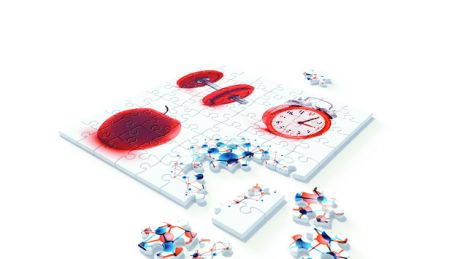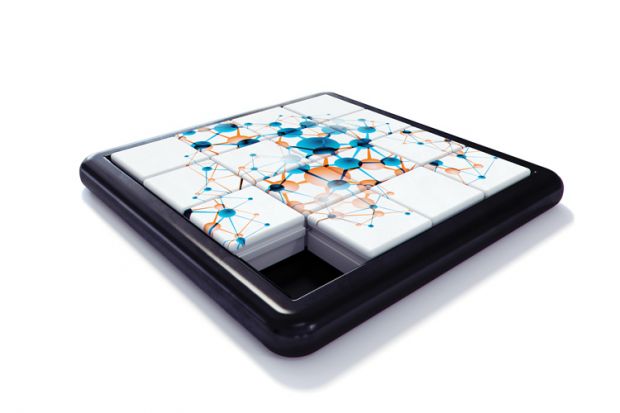Why hormones are so important to your training
MF explains how to harness the power of your hormones to ensure you're getting the best out of what you're eating and how you're training

If you spend any time in a gym, you’ll probably hear guys talking about how their training is going. You’ll also hear them discussing their nutrition strategies for bulking up or getting lean. And you may even hear them chat about what they’re doing to speed up the recovery process ahead of their next session.
What you’re unlikely to hear, however, is talk about what they’re doing to optimise their hormones. You won’t hear it because, even though your hormones dictate everything from your mood to your ability to pack on muscle, this is an area of performance that’s almost entirely overlooked.
Our guide to the key players in your hormonal cascade (the term used to describe how they work together) will help you solve the final piece of the training puzzle.
Testosterone
Also known as: The ‘man’ hormone
What it does: Improves muscle mass, strength and bone density, improves brain function and protects against everything from Alzheimer’s to cancer
To harness its power you should: Live like a caveman
How to do it: ‘The simple way to boost testosterone is to live like a hunter-gatherer and part-time nun,’ says nutritionist and trainer Ben Coomber (bodytypenutrition.co.uk). ‘Get lots of sleep, preferably with the sun’s cycle – 10pm to 6am is ideal if you can manage it. Eat lots of meat, fats and whole, natural foods. Train with big compound lifts, adding some sprinting, jumping and playing. Avoid alcohol binges – they can halt testosterone production for up to two days – but do enjoy the odd glass of red wine. Drink lots of water – around 2.5 to 3 litres a day is ideal for most guys. Avoid coffee after 4pm and rest and relax when you can. Also, have lots of sex if you can manage it.’ Hence the ‘part-time’ caveat.
Get the Coach Newsletter
Sign up for workout ideas, training advice, reviews of the latest gear and more.
Growth hormone
Also known as: HGH, when it’s injected as a prescription muscle-builder
What it does: Stimulates growth, cell reproduction and regeneration
To harness its power you should: Manage your mealtimes
How to do it: Your testosterone-boosting plan will also help with your production of growth hormone, but you can improve it further by timing your food intake. ‘The most effective way to boost HGH varies depending on when you exercise,’ says Coomber. ‘If you train early in the morning, try taking on caffeine and branched-chain amino acids (BCAAs), working out on an empty stomach and then eating 30 minutes after training. The first two or three sessions will seem tough, but you’ll quickly adapt as your body becomes more efficient at using its own energy stores.’
If you train in the evening, though, your body should be fuelled without the caffeine and BCAAs. ‘You should still have a post-workout meal 30 minutes afterwards but it should include simple carbs such as potatoes, white rice or protein pancakes,' Coomber says. ‘They’ll promote quicker recovery and larger spikes in insulin, but your high blood glucose level will drop around two hours later, leaving HGH to rise.’

DHT
Also known as: The man-maker
What it does: Boosts your mood, increases your strength and improves your sex life
To harness its power you should: Eat good fats from organic and free-range animals
How to do it: Dihydrotestosterone – to use its full title – is the most important hormone you’ve never heard of. According to Warrior Diet creator Ori Hofmekler, it’s ‘the king of male hormones, and ten times stronger than testosterone’. It also can’t be converted into oestrogen, unlike testosterone.
So how do you optimise your levels? ‘The best way is to consume adequate dietary fat,’ says strength and conditioning coach Mike Mahler. ‘Coconut oil and milk are good sources. Magnesium oil and zinc can also help.’ And eat free-range. ‘Meat from factory farms is loaded with toxins and stress hormones,’ says Mahler. ‘You can’t eat healthy meat from unhealthy animals, and the fewer toxins you consume, the more energy you’ll have available for optimal hormone production.’
Cortisol
Also known as: The stress hormone
What it does: It’s released in response to stress, freeing up glucose for the brain and generating energy from your stored reserves – but there’s a price to pay
To harness its power you should: Keep calm and reassess your life
How to do it: Let’s be honest you can’t eliminate all the stress from your life. Work, family life, emotions, food, booze, late nights and your mindset all contribute to an increase in stress, so you should focus on what you can control and stop worrying about what you can’t. ‘The best advice is to force yourself to look at the stress factors in your life, which are unique to every individual,’ says Coomber. ‘Is your boss acting like an arse? You need take steps to address that. Do you overdo cardio-based training? Cut back and factor in some more resistance training or therapeutic exercise, such as yoga. Is your diet too high in alcohol, processed foods or other unhealthy things? Clean it up. Do you stay up late watching TV? Switch to reading for the 30 minutes before bed. Is a family member or friend causing you stress? Tackle the issue head on and resolve the conflict.
As well as solving problems, you may find you need to alter your mindset. ‘If you’re generally a stressed person, you need to change your thought process and look at problems and scenarios from a different perspective,’ says Coomber.
Insulin
Also known as: The carb-and-fat regulator
What it does: Helps cells take up glucose for energy, and regulates metabolism
To harness its power you should: Avoid bread and cereal
How to do it: You’ve probably heard of insulin because of its role in diabetes – Type 1 diabetics can’t produce it, while Type 2 sufferers produce too much because the body isn’t using it effectively. Insulin is necessary for carrying nutrients to cells, including glucose for brain function. The thing you need to avoid is insulin resistance. ‘Carbohydrates are the biggest stimulators of insulin,’ says Mahler. ‘Protein is a mild stimulator, but it also stimulates glucagon, which helps to balance out the effect. To optimise your insulin levels, get your carbohydrates from low-glycaemic fruits, legumes and vegetables. Focus on healthy fats from nuts and seeds, olive oil, coconut oil and omega 3s. Try a meal with a tablespoon of coconut oil two hours before a workout, and enjoy the benefits.’

Dopamine
Also known as: The happiness hormone
What it does: Helps you stay organised, social and confident and free from addictive behaviours
To harness its power you should: Swap salt and sugar for spices
How to do it: ‘Dopamine is what gives your body the boost it needs to get out of bed in the morning and take charge of your day,’ says Mahler. ‘It’s important in mood, motivation, attention and learning, and is also connected to addictive behaviour – people with low levels are often addicted to quick pleasure and succumb easily to addictions.’ If you’re lacking motivation or feeling tired and burned out, dopamine is the hormone to address.
Start by cutting out foods that lower your levels: ‘Sugar, white bread, pasta and other processed snacks hamper dopamine production,’ says Mahler. ‘To raise your levels, try supplementing with vitamin B and L-carnitine. Fresh spices will help: nutmeg is great for a boost in your morning shake, but cinnamon, basil, cumin and turmeric are all great additions to your diet.’
Leptin
Also known as: The hunger hormone
What it does: Acts as the go-between for your fat cells and your brain.
To harness its power you should: Eat less frequently and better
How to do it: ‘Leptin is a hormone in fat cells that communicates with the brain to determine energy expenditure,’ says Mahler. ‘When functioning adequately, leptin acts as a fuel gauge and lets us know when we have enough fuel to stop eating before nutrient spillover occurs, leading to the storage of body fat.’
You’re likely to have enough of this hormone, but problems start when leptin resistance sets in and your brain doesn’t receive the signals properly. Thankfully, it’s easy to fix. ‘Cut out high-fructose junk foods, and focus on high-quality organic food,’ says Mahler, ‘You should also eat protein at every meal – especially breakfast. I like a power shake with 40g of protein, low GI fruits such as blueberries and essential fats.’ Take longer gaps between meals for fat loss – you can eat more frequently on training days, but leave longer gaps a few times a week.’
Melatonin
Also known as: The sleep hormone
What it does: Helps the quality and quantity of your sleep, which in turn affects every other hormone
To harness its power you should: Sleep longer and better
How to do it: ‘Melatonin is secreted by the pineal gland in the brain – it increases in
response to darkness and decreases in response to light,’ says strength coach Phil Learney. ‘It plays a large part in sleep, so if its production is disrupted it can affect sleep patterns and hormonal cycles. People with jet lag or those who work night shifts can often have trouble producing melatonin, which affects their sleep and subsequent recovery from stresses.’
To give it a helping hand, you need to improve your sleep environment. ‘As we no longer wake to the sun rising and sleep as the sun goes down, we need to replicate complete darkness in order to sleep effectively. Any light source, including LED lights on alarm clocks, is enough to disrupt this cycle,’ says Learney. In other words, turn them off.
If you’re deficient you can be prescribed melatonin supplements. You can avoid this, however, by eating foods high in folic acid and vitamin C (which includes most green vegetables) and protein (such as beef, poultry and dairy).
From 2008 to 2018, Joel worked for Men's Fitness, which predated, and then shared a website with, Coach. Though he spent years running the hills of Bath, he’s since ditched his trainers for a succession of Converse high-tops, since they’re better suited to his love of pulling vans, lifting cars, and hefting logs in a succession of strongman competitions.

